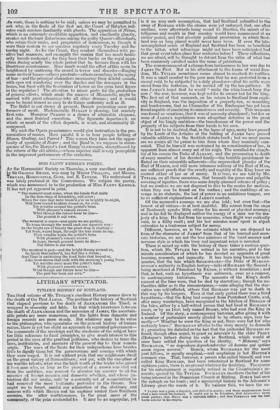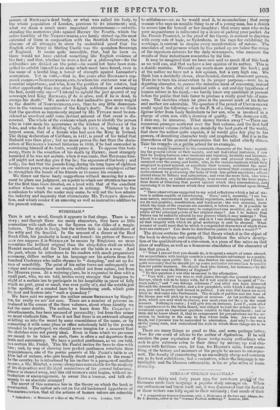LITERARY SPECTATOR.
TYTLER'S HISTORY OF SCOTLAND.
THE third volume of Mr. TYTLER'S excellent History conies down to the death of the First JAMES. The portion of the history of Scotland that elapsed previous to the death of ALEXANDER the Third, is wrapped in obscurity and fable. In that which intervenes between the death of ALEXANDER and the accession of JAMES, the ascertain- able points are more numerous, and the lights from domestic and foreign records are more steady. But whatever may be its value to the philosopher, who speculates on the general history of human i nature, there s yet too slight an approach to regulated4government- the commands of the sovereign and the obedience of the subject have too little reference to fixed principles, to give much interest to this period in the eyes of the practical politician, who desires to trace the laws, institutions, and manners of the present day to their remote origin. The wars of the Scots for their independence have besides little to dignify them but the perseverance and courage with which they were waged. It is not without pride that our neighbours dwell on the great victory of Bannockburn; and yet, with the exception of his warlike talents, what was the high worth of the leader who gained it ?—a man who, so long as the prospect of a crown was shut out from his ambition, was content to abandon his country to all the miseries of foreign invasion and domestic rebellion, and whose pa- triotism did not awake, until by a cowardly act- of assassination he had removed the more legitimate pretender to the throne. Nor ought we to forget, amidst our admiration of the obstinacy and success with which BRUCE and his captains routed their Southern enemies, the utter worthlessness, to the great mass of the community, of the prize contended for. It may be an unpopular, yet is it no very rash assumption, that had Scotland submitted to the sway of EDWARD while the chains were yet unforged, that, one after another, were afterwards hung round its liberties, the march of in- telligence and wealth in that country would have commenced at an earlier period, and that absolute political prostration in which Scot- land was so long placed would never have been. If even the late.. accomplished union of England and Scotland has been so beneficial to the latter, what advantage might not have been anticipated had that great event taken place four centuries before ! These reflections, we are afraid, will be thought to detract from the value of what has been commonly extolled under the name of patriotism. The commencement of a change from lawlessness to law was due to Jasmas the First. But in his attachment to the forms of social free- dom, Mr. TYTLER sometimes seems almost to overlook its realities. It was a small comfort to the poor man that he was protected from a casual raid, to be subjected to a daily plunderer—,that his cattle were saved from the ketheran, to be carried off by the tax-gatherer. It was JAMES'S boast that he would " make the whin-bucsh keep the cow the cow, however, was kept not for its owner but for the king. The first act of that monarch, on his return to Scotland from capti- vity in England, was the imposition of a property-tax, so searching and burdensome, that no Chancellor of the Exchequer has yet been found capable of emulating its minuteness and severity. This measure was found so vexatious, that it was of necessity abandoned ; but few or none of JAMES'S regulations were altogether defective in the great object of his kingly ambition—the transference of the power and the property of his subjects from their hands to his own. It is not to be doubted, that, in the lapse of ages, many laws passed by the Lords of the Articles at the bidding of JAMES have proved valuable additions to the Scottish statute-book ; but we must pause ere we assign all the praise to him from whom they nominally ema- nated. That he himself was restrained by no consideration of law, is apparent from almost every act of his reign. The uncalled-for slaugh- ter of his cousin the Duke of ALBANY, and the prosecution to death of every member of his devoted family—the horrible punishment in- flicted on their miserable adherents—the unprovoked plunder of the Earl of MARCH, and still more infamous robbery of the Earl of MAR, are sufficient proofs that the cruelty and cupidity of the King knew no control either of law or of mercy. It is true, we are told by Mr. TYTLER, on all these occasions, that beneath the gross and palpable covering of injustice, there was some deeply-planned scheme of policy; but we confess we are not disposed to dive to the centre for motives, when they can be found on the surface ; and the ranklings of re- venge in an obdurate, the lust of power in an ambitious temper, are to us sufficient explanations of JAMES'S conduct. Of the monarch's courage we are also told ; but even that—the lowest of all virtues—is at best doubtful. His retreat from the siege of Roxburgh speaks little either for his moral or physical courage ; and in his fall he displayed neither the energy of a man nor the ma- jesty of a king. He fled from his assassins, when flight was evidently vain, to a filthy vault; and his last minutes were spent in abject entreaties to a traitorous subject for mercy. Different, however, as is the estimate which we are disposed to form of the character of JAMES* from that of his learned and accu- rate historian, we are not the less admirers of the lucid manner and nervous style in which his busy and important reign is narrated. There is mixed up with the history of these times a curious ques- tion, which Mr. TYTLER has noticed in his narrative, and to the minute consideration of which he has devoted an appendix of great learning, research, and ingenuity. It has been long known to anti- quaries, that the tale which SHAKSPEARE—the Duke of MARLBO- ROUGH'S authority in English history—tells of RICHARD the Second's being murdered at Pantefract by EXTON, is without foundation ; and i that, n fact, such an hypothesis was unknown, even as a rumour, to contemporary historians. The accounts of the King's death current at the time were, that he died by starvation ; though the au- thorities differ as to the circumstances,—some alleging that the star- vation was self-inflicted, others that RICHARD was put to death in this way by his keepers. Even at that early period there was a third hypothesis,—that the King had escaped from Pontefract Castle, and, after many wanderings, been recognized in the kitchen of DONALD of the Isles, either by a half-witted person that had lived at RICHARD'S court, or by an Irish lady named BISSET, who had seen the King in Ireland. Of this story, a contemporary historian, after giving it with a number of particulars merely alluded to by others, says, very ho- nestly—" Whether he were the King or not, there were but few who certainly knew." BUCHANAN alludes to the story merely to discredit it ; grounding his disbelief on the fact that the pretended RICHARD re- fused, though often urged, to grant an interview to the elder PERCY (Hotspur's father) during his exile in Scotland, which would at once have settled the question of his identity. " Metuens," says BUCHANAN, " no impostura deprehenderetur ab homine qui optime SILIGI7b re,rem noverat.- BOECE, whom BUCHANAN for the most part follows, is equally sceptical,—and scepticism is hot HECTOR'S common vice. That, however, a person who called himself, and was called King RICHARD, had been entertained in Scotland for some eighteen years, there is no ground whatever for doubting. The charge for his entertainment is regularly noticed in the Chamberlain's ac- counts, quoted by Mr. TyTLER. BUCHANAN mentions the fact of his being interred in the Dominican Church at Stirling. BOECE had seen the epitaph on his tomb ; and a manuscript history in the Advocate's Library gives the words of it. To balance this, we have the ex- * JAMES was a poet, a linguist, and skilled in music; and these acquirements bare shed a halo round his memory. It ought not to be forgotten, that Aucosmus wrote small poetry; that NERO ME a tolerable fiddler ; and that Tisza us was the beat Latin scholar in his empire. posure of RICHARD'S dead body, or what was called his body, to the whole population of London, previous to its interment; and, what we deem a much more important circumstance—notwith- standing the numerous plots against HENRY the Fourth, which the active hostility of the NORTHUMBERLAND family stirred up, the most extended of them in conjunction with the Scottish Governor, the absence of all attempts to show by undoubted proof that the English exile living in Stirling Castle was the quondam Sovereign of England. It seems quite incredible, that, had he been so, there would not have existed something like English evidence of the fact; and that, whether he were a fool or a philosopher—for the authorities are divided on the point—he would not have been com- pelled to exhibit himself to an army which must have found, even in the name of a lawful king, a tower of strength against Lancaster's usurpation. Yet in 1405,—that is, five years after RICHARD'S sup- posed escape,—NORTHUMngRLAND, to whom his existence was of so essential importance, and who, from the position of his estates, had better opportunity than any other English nobleman of ascertaining the fact, could only say—" I intend to uphold the just quarrel of my sovereign lord King RicnAius, if he is olive, and, if he is dead, to avenge his death." We confess we feel inclined to give more weight to the doubts of NORTHUMBERLAND, than to any little discrepan- cies in the various narratives of the King's death. Nor do we think that the question so ingeniously argued by Mr. TYTLER must be con- sidered as unsolved until some distinct account of that event is dis- covered. The whole of the evidence which goes to identify the person who in 1400 made his appearance in the kitchen of DONALD of the Isles, and who died in 'Stirling Castle in 1419, is' taking it in its largest sense, that of a female who had seen the King m Ireland. The dying declaration of Cobham, in 1417, is proof of his belief that Richard was then alive ; but no more proves the fact than the decla- ration of RICHARD'S learned historian in 1830,.if he had succeeded in convincing himself of its truth, would prove it. To oppose this testi- mony, there is the assertion of his death by HENRY, most strangely hazarded if he was not certain, when it was made, that RICHARD him- self might not next day give it the lie; the exposure of the body ; and lastly, the fact that the pseudo King, during the long lapse of eighteen or nineteen years, was never on one solitary occasion employed either to strengthen the hands of his friends or to annoy, his enemies. We throw out these hasty suggestions without meaning for a mo- ment to place our judgment, on a point to which our attention has now for the first time been directed, on a level with that of the excellent author whose work we are engaged in noticing. Whatever be the conclusion to which the reader may come, he will not the less admire the industry and ingenuity that characterize Mr. TYTLER'S disserta- tion, and which render it an amusing as well as instrudive addition to the present volume.



















 Previous page
Previous page